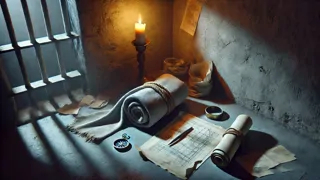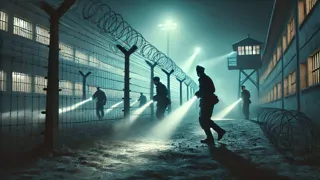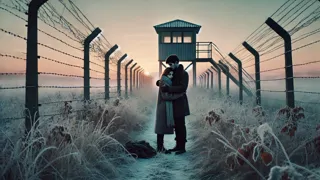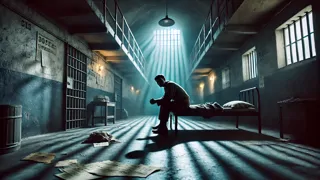Introduction
John Caldwell sat on the narrow bunk pad in his cell, the low hum of corridor footsteps echoing through iron doors under a single weak bulb. Each evening, the moon cast slender bars of pale light across the concrete floor, reminding him that beyond these walls, Anna waited. He closed his eyes and recalled the crisp afternoon they’d met in a rain-drenched park back home: her laughter threading through the pines as he offered his last piece of chocolate, her eyes soft with curiosity. That memory had anchored him ever since the night his fighter jet faltered above the Oder River. Dragged into the bowels of an East German prison, he endured interrogations, whispered rumors of exchange deals, and the relentless boredom of solitary hours. Still, he cataloged every guard rotation, every flaw in the barbed-wire fence, every irregularity in the cell’s stonework. He had no illusions: escape meant death if caught. Yet Anna’s name gave him courage. Her letters, smuggled by sympathetic Red Cross workers, arrived scarred with water stains and smudged ink, vows of any border crossed, any obstacle toppled, to bring him back. In the silence of his cell, he sketched blueprints on torn scraps of paper—angles of approach, timing of sentries, heel turns on his boots to muffle the crunch of gravel. Through this nightly ritual, he transformed fear into purpose. Soon, the pattern would be complete, and under an unforgiving moon, he would take his leap of faith. Across the Iron Curtain and into Anna’s embrace, John promised himself, his heart would guide him free.
The Hidden Plan
John’s first weeks in the cell had been torture—days of isolation, the snap of steel doors, interrogators’ clipped voices through the walls. But after pain dulled and hope flickered, he began to observe rather than despair. At dawn, the guards still shuffled in pairs, their boots thudding on stone. Midday, a single dog patrol barked at the fence line before retiring. He counted precisely six men on night shift, rotating every fifth evening to a neighboring block. In the dawn’s pale glow, he traced the route from his window to the outer wall, measuring each paver by ear, noting the echo of each footfall. This became his secret curriculum: mapping the prison from within.

He tore strips from his prison blanket to tie together a makeshift rope, knotting them with trembling fingers under the watchful eye of a portrait of Stalin in the corridor. Each knot represented a vital step in his plan. Beneath the floorboards where dust gathered, he concealed his scraps of paper—blueprints and calculations—that no guard was willing to search. By night, when the block’s lights blinked off, he practiced silent movement along the narrow corridor, bending low to avoid metal detectors he knew were inactive. The risk thrilled and terrified him, but longing for Anna lent him steady nerves. Many prisoners lost their bearings in despair—he would not.
Alliances shifted as he watched: a Russian veteran who whispered warnings of betrayal, a Czech inmate who traded bits of bread for news of outside sympathizers, and a sympathetic nurse who smuggled a small compass tucked in a linen bag. With each new clue, John improved his chart: the exact location of an access tunnel underneath a rusted gate, the schedule of supplies driven through a back entrance, the dim corner where shadows swallowed a guard’s silhouette long enough for a man to slip past. In his mind, every moment was rehearsed until escape transformed into routine. Against the oppressive weight of Cold War suspicion, he built a clandestine pathway of hope.
Crossing the Divide
The night of the escape arrived with a wind thick enough to ripple the prison’s floodlights. John slipped from his cell in the last moments before guard change, his heart pounding with each measured step across damp granite. He followed the plan scrupulously: a turn left at the third column, soft heel-padded steps toward the service tunnel, and through the hatch beneath a broken valve. The path was narrower than he’d imagined, forcing his shoulders to brush wet pipes, but every inch brought him closer to freedom. He paused in the tunnel’s curve to listen—only the distant hum of engines and a stray dog’s bark. He pressed on.

Emerging beneath a lattice of barbed wire, John felt moonlight on his face for the first time in weeks. Above, patrol lights scanned methodically. He crouched, waiting for the perfect interval when two guards’ beams crossed elsewhere. Timing was everything; one false move would trigger gunfire. He clenched the compass, hearing Anna’s voice stead him: “Come home.” With a steady breath, he sprinted through the open ground, rolling as gravel kicked up behind him. A single shout pierced the night—he dashed toward the boundary ridge, scaling a bank of barbed coils with sleeves torn wide, stepping on bloodied palms.
On the far side, a wooded ridge concealed him. He pressed his back against a fir trunk, panting, every nerve alive as distant alarms began wailing. He tugged his compass, oriented north toward the River Elbe, and set off into the trees. His plan now relied on the Czech smuggler’s escort—an old truck parked in a log clearing. Branches snagged his coat and scraped his face, but adrenaline propelled him forward. In a dim glade, headlights split the darkness. He waved frantically as the engine idled. The smuggler’s voice hissed in broken English: “Quick, climb in.” John leapt aboard, heart lodged in his throat. As the truck rumbled away, he allowed himself a trembling smile—he had slipped Iron Curtain’s grip.
Leap of Faith
The final leg was the most perilous: traversing no-man’s-land before reaching the American checkpoint hidden in an abandoned farmhouse miles away. The smuggler nodded at the map etched on John’s palms, pointing north under the faint aurora that danced across a frosty sky. Each mile churned the engine and rattled nerves until their tires crunched onto gravel near a roadside sentinel who demanded coded passwords. John swallowed fear as the American captain peered through binoculars from a watchtower, then dropped them with a nod and a whistle. Relief surged, but he forced his mind to remain alert—patience was survival.

Inside the farmhouse, agents wrapped him in a thick coat and led him through the final inspection. As dawn broke, the first sliver of sunlight cast long shadows on frost-tipped fields. He paused at the edge of a wire fence to gaze back at the horizon where he had fled. Then he spotted her—Anna, escorted by a Red Cross car, bundled in a scarf, tears freezing on her lashes. He dashed across the barbed divide, ignoring shouts from both sides. Her arms opened as he stumbled into the snow, and she collapsed into his embrace.
Above them, the chill morning sky stretched endless and free. John pressed his forehead to Anna’s, tasting salt and snow in the air. All the months of fear, planning, and hidden notes led to this moment. The border fence loomed behind them like a distant nightmare already fading. For John, the leap of faith wasn’t just in outrunning guns or scaling walls—it was trusting that love could survive suspicion and iron. Bound together in that dawn light, their hearts beat in defiance of politics, concrete, and cold steel—proving that hope can cross any divide.
Conclusion
As the sun climbed over East German ridges, John and Anna boarded a relief train bound for West Berlin. Each clack of the rails resonated like the thud of a freed heartbeat, each passing town a milestone in their journey from captivity to new beginnings. He pressed their intertwined hands against his chest, feeling the pulse of gratitude and love. The Iron Curtain’s heavy shadow lay miles behind, replaced by a horizon tinged pink with promise. They would never forget the cost of freedom—countless nights of fear, the ache of separation, and the shadows of those left behind. But the bonds forged in hardship proved stronger than steel bars or distant ideologies. In West Berlin, the city’s buzz of hope washed over them: laughter in the streets, crowds gathered for reconciliation, ribbons of music floating from open windows. Anna rested her head on his shoulder, and John, once reduced to a number in a Cold War prison, felt whole again. Wherever life led them next, they would carry this night’s daring escape like a shared victory song, a testament that love and courage can prevail even when the world seems determined to keep hearts apart.



















